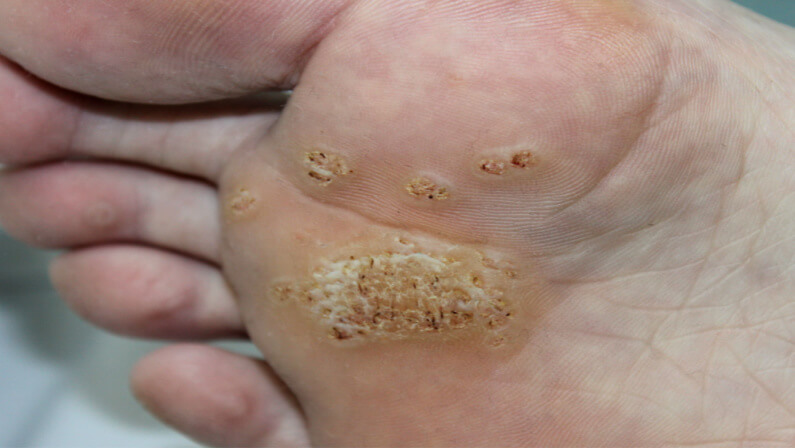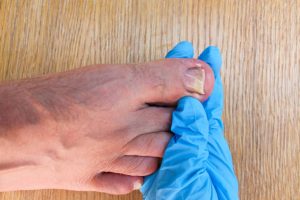Plantar warts are small growths that develop on the soles of the feet due to the human papillomavirus (HPV). While they are generally harmless, they can be uncomfortable and painful, especially when pressure is applied while walking or standing. Understanding the symptoms of plantar warts can help you determine when it’s time to seek help from a foot specialist in Chicago. In this blog post, we’ll explore the common symptoms associated with plantar warts and the importance of professional treatment.
Identifying the Symptoms of Plantar Warts
Recognizing the symptoms of plantar warts early can prevent discomfort and complications. Here are the key signs to look out for:
1. Hard, Grainy Growths on the Foot
One of the most noticeable symptoms of plantar warts is the appearance of hard, grainy growths on the soles of your feet. These warts may vary in size and can be:
- Small and Rough: Typically, plantar warts are about the size of a pencil eraser or smaller. They have a rough, dry surface that can be grey or brown.
- Flat or Elevated: Some warts may be flat and blend in with the surrounding skin, while others may protrude slightly.
2. Pain or Discomfort
Plantar warts can cause varying levels of pain, especially when pressure is applied. You might experience:
- Localized Pain: The pain may be concentrated at the site of the wart, making walking or standing uncomfortable. This is often described as a sharp or aching sensation.
- Increased Discomfort: The discomfort can worsen over time, particularly if the wart is subjected to continuous pressure from activities like walking or running.
3. Black Dots in the Wart
Upon closer inspection, you might notice tiny black dots within the wart. These dots are actually small blood vessels that have clotted. This feature can help differentiate plantar warts from other foot conditions, such as corns or calluses.
4. Changes in Walking or Gait
If the pain from the wart affects your ability to walk comfortably, you may unconsciously change your gait to alleviate discomfort. This can lead to:
- Altered Walking Patterns: You might find yourself limping or favoring one foot over the other, which can result in further complications, such as joint pain or muscle strain.
- Increased Pressure on Other Areas: Altering your gait can place additional stress on other parts of your foot, leading to other foot problems over time.
When to Seek Help from Chicago Specialists
If you notice any of the above symptoms, it may be time to consult a Chicago foot doctor. Here are some guidelines on when to seek professional help:
1. Persistent Pain
If your plantar wart is causing ongoing discomfort that affects your daily activities, it’s essential to get professional advice. Chronic pain may indicate that the wart requires treatment to alleviate discomfort.
2. Changes in Size or Appearance
Keep an eye on the wart’s size and appearance. If you notice it growing larger, changing color, or becoming increasingly painful, it’s crucial to seek help. These changes could indicate a need for further evaluation.
3. Multiple Warts or Recurrence
If you develop multiple plantar warts or experience recurrent outbreaks, consult a specialist. A foot doctor can provide effective treatment options to manage and prevent the spread of warts.
4. Diabetic or Immunocompromised Patients
Individuals with diabetes or weakened immune systems should be particularly cautious. Any foot issue, including plantar warts, can lead to complications. If you fall into these categories, it’s best to seek help at the first sign of a wart.
Expert Care at Michigan Avenue Podiatry
At Michigan Avenue Podiatry, our team of board-certified podiatrists, including Dr. Kelsey Krotiak, Dr. Asim Qureshi, Dr. Zane Qureshi, Dr. Kevin O’Connor, and Dr. Mohammad Usman, is committed to providing comprehensive foot care for all your needs. We offer personalized treatment plans to address plantar warts and other foot conditions, ensuring you receive the best care possible.
Conclusion: Don’t Let Plantar Warts Hold You Back
Recognizing the symptoms of plantar warts is the first step in seeking timely treatment. If you’re experiencing discomfort or have concerns about growths on your feet, don’t hesitate to reach out to our Chicago specialists. Early intervention can help you find relief and maintain optimal foot health, allowing you to stay active and enjoy life to the fullest.




